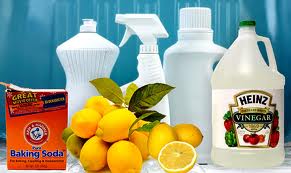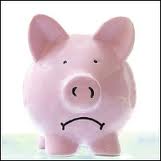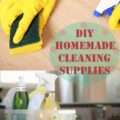
Who doesn't want a clean home and a safer environment in which to live?
Whether it is the bathroom, living room, kitchen, or other rooms in one's residence, everyone has to clean at one time or another. With the economy still struggling along, finding affordable cleaners can be as easy as purchasing or making products right in the home that are friendlier towards the environment.
In the event that you find yourself tiring of spending money on brand-name cleaning products–while feeling concerned they may be doing more harm than good for both you and the environment–there are alternatives to consider.
Before using homemade products, however, remember to always keep all formulas well-labeled and where children and/or your pets cannot access them.
How to Make Household Cleaners
Baking Soda – Replace your scouring powder with baking soda! It's less abrasive, chemical free and cheap! Simply sprinkle it in your sink or tub, scrub and rinse.
Vinegar – Use vinegar to make your own window cleaner that won't leave a residue behind! Mix together in a 16-ounce spray bottle:
- 2 cups water
- ¼ cup white vinegar
- ½ teaspoon dish detergent
Lemon – This product works wonders against the majority of household bacteria, including those germs that are oftentimes found in one's kitchen and bathroom. Not only are you left with cleaner counters, but you also enjoy a better smelling room.
Borax– Using this ingredient, you are able to clean, deodorize, and disinfect simultaneously. Try this recipe for a homemade all-purpose cleaner:
- 2 cups warm water
- 3 tablespoons white vinegar
- 1 teaspoon borax
- 1-2 drops lemon essential oil (optional)
Mix the vinegar and borax in a 16-ounce spray bottle, then add the water and shake until it’s mixed well. Add a couple drops of lemon oil to add a fresh scent.
Cornstarch – This product can be put to the test cleaning items like furniture, windows, and to shampoo rugs and carpets.
Microfiber cloths – Great for lifting off dirt, these also remove grease without the need for cleaning chemicals. The cloth goes deep into areas in need of cleaning, trapping the dirt. Finding the right cloth can last you an endless amount of cleaning occasions.
Combine hydrogen peroxide and water – In order to go after mold in bathroom tiles and on counter surfaces, combine one part hydrogen peroxide (3%) with two parts water in a spray bottle and spray on areas with mold. Not only is mold unattractive, but it can impact your health by exposing your lungs to harmful materials.
Combine white vinegar and water – Another thing that teams well with water for cleaning purposes is white vinegar. The goal here is to combine equal parts white vinegar and water in a spray bottle. Spray the combined ingredients directly on a stain such as those on carpets, let sit for a few minutes, and clean with a brush or sponge using warm soapy water.
Battle clogs in your household drains – It is not uncommon for kitchen sinks and bathtubs to get clogged up from food particles, hair, etc. In order to deal with such smaller problems, put 1/2 cup salt in 4 liters water, heat, and apply to the drain. For tougher cleaning battles, pour approximately 1/2 cup baking soda down the drain, then 1/2 cup vinegar. The resulting chemical reaction can attack fatty acids and break them down into soap and glycerine, allowing the clog to move down the drain. After approximately 15 minutes, pour in boiling water to break up residue. This method should only be used in cases of metal plumbing. Individuals should also avoid this method following the usage of a commercial drain opener, as the vinegar can mix with the drain opener, resulting in dangerous fumes.
Polish away the dirt – When you want to polish your furniture, simply add several drops of lemon oil into 1/2 cup warm water. Mix the ingredients well and spray onto a soft, damp cotton cloth. Wipe the furniture with the cloth, finishing up by wiping once more with a dry soft cotton cloth.
Don't unnecessarily throw away reusable bottles – Many cleaning products that you purchase in stores can be reused time and time again. Among those items are dish cleaners sold in plastic squeeze bottles. In order to save money over time, take the empty bottles and refill them with a variety of other cleansers you make from home. Not only are you saving money, but it is one less product for the local landfill.
Cleaning household gutters and spouts – For those who own a home, cleaning out the gutters and spouts is a yearly chore, especially in areas of the country where leaves drop in the fall. All the necessary tools for this type of cleaning can be found right in your home. Two of the best means are using your gardening hose or doing it by hand. If you choose to do it by hand from a ladder, simply slide a narrow item such as a kitchen spatula into the gutter and drag along while wearing gloves to clean out leaves, twigs, and other debris. On the other hand, you can use a gardening hose to flush out any clogs.
When all is said and done, making countless trips to the store for this and that cleaning product can get tiresome and downright expensive. Simple items such as vinegar, baking soda, rubbing alcohol, borax, and your garden hose can save you money and lessen the potential health risks in your home for you and your family.
Keep in mind that one in three people suffer from allergies, asthma, sinusitis, or bronchitis (U.S. National Center for Health Statistics). Lessening the amount of synthetic chemicals in the home environment and using more of what you already have inside your residence is just one way to treat these types of conditions.
Improved health and a bigger wallet….that's a combination that is nothing to sneeze over.
~~~~~~~
written by: Dave Thomas
~~~~~~~
Photo credit: Inhabitots.com



